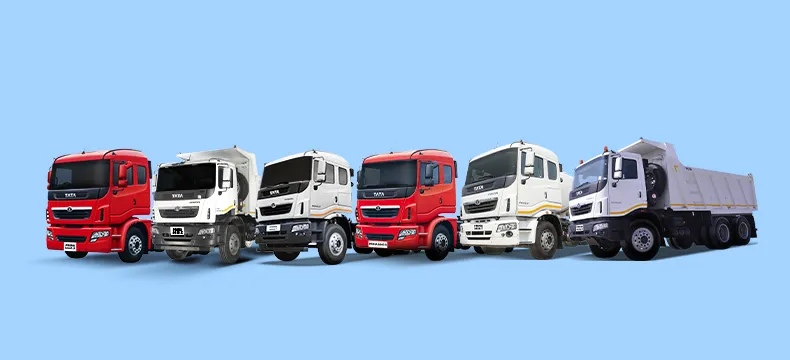12 Dec 2025

Logistics Transportation: Solutions for Efficient Operations
- Tata Motors
- 16 May 2025
- COMMERCIAL VEHICLE
Introduction
The logistics market in the UAE is projected to grow at 7.44% CAGR and increase to USD 11.31 billion by 2028. The rapid response time demanded by customers and the highly competitive market are the reason for such estimated growth. Thus, strengthening the logistics operations of your business is the way to survive in the complex infrastructure and diverse markets of the Middle East. With efficient logistics transportation, you can ensure goods move swiftly, safely, and cost-effectively across touchpoints. How do you achieve that? Learn in this blog.
What is Logistics Transportation?
Logistics transportation involves the movement of goods from their origin to the final consumer. It encompasses various modes such as road, rail, air, and sea. You can select the modes that are suitable to you based on factors like cost, speed, and nature of the goods. Efficiency in logistics operations ensures your products are delivered on time and in optimal condition. This helps meet customer expectations and minimise operational disruptions.
Types of Logistics Transportation
The various types of logistic transportation include:
-
Road Transport
Apt for flexibility and direct delivery routes. It covers short to medium distances and is the most common mode of transport.
-
Rail Transport
Suitable for moving bulk goods over long distances. It offers a balance between cost and speed.
-
Air Transport
The fastest mode. It is ideal for high-value or time-sensitive goods. However, it comes at a higher cost and is widely used in Middle Eastern airports for rapid deliveries.
-
Sea Transport
Best for large volumes of goods with less urgency. It is a cost-effective solution for international shipping, especially in the UAE due to significant ports.
-
Intermodal Transport
This mode of logistics transport combines multiple modes, such as rail and road, to optimise efficiency and save costs.
Importance of Transportation Efficiency in Logistics
Achieving efficiency in logistics transport is crucial for your business due to the following reasons:
-
Reduced Costs
Efficient transportation minimises fuel consumption and labour costs.
-
Customer Satisfaction
Timely deliveries with well-planned logistics help gain customer trust and loyalty.
-
Swift Operations
With efficient logistics, you can respond swiftly to market demands and supply chain requirements.
-
Sustainability
Optimised logistics transportation reduces fuel emissions and energy consumption. It also supports eco-friendly logistics operations.
-
Regulatory Compliance
There are strict transportation regulations in the UAE. Efficient logistics ensure compliance with such laws and prevent operational delays and penalties.
Ways to Improve Transportation Efficiency in Logistics
You can bolster the efficiency of logistics transport by employing the following strategies:
-
Advanced Fleet Management
Using fleet management software helps you track performance in real-time and plan routes optimally, which reduces delays and fuel consumption.
-
Regular Vehicle Maintenance
You can schedule maintenance of logistic trucks to prevent breakdowns and extend vehicle lifespan.
-
Training Programs for Drivers
Educating drivers on fuel-efficient driving techniques and safety protocols can lead to significant profits in the long run.
-
Adopt Smart Technology
Technology simplifies operations. For example, AI-powered predictive analysis and IoT-enabled tracking optimise logistics efficiency.
-
Load Optimisation
You can maximise cargo space utilisation to reduce the number of trips required. Thereby cutting costs.
Conclusion
Efficient logistics and transportation are basic needs for a successful supply chain. It is especially important in the fast-growing and competitive markets of the Middle East. By optimising transportation in your business, you can reduce costs, improve delivery timelines, and improve customer satisfaction. You can also employ a mix of transportation modes and equip it with smart technology and efficient fleet management to streamline operations. As you gear up to improve logistics operations, having the right vehicles in your fleet is important.
FAQs
What are the biggest challenges in logistics transportation?
Some of the major challenges include high fuel costs, traffic congestion, regulatory compliance issues, and supply chain disruptions. Additionally, the extreme weather and cross-border complexities in the Middle East add to the challenges.
How can businesses reduce logistics costs?
As a business owner, you can cut logistics costs by optimising delivery routes, scheduling regular maintenance of the logistic vehicles, reducing fuel consumption, and using data-driven strategies to streamline operations.
What is the role of last-mile delivery in logistics?
Last-mile delivery is the final step in the logistics chain. It ensures that the goods reach customers quickly and efficiently. It plays a critical role in customer satisfaction, especially in e-commerce and retail businesses, where timely deliveries can make or break profit margins.
- Tags





















